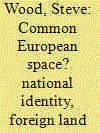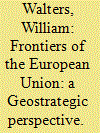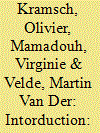|
|
|
Sort Order |
|
|
|
Items / Page
|
|
|
|
|
|
|
| Srl | Item |
| 1 |
ID:
053385


|
|
|
|
|
| Publication |
Autumn 2004.
|
| Summary/Abstract |
In central and eastern Europe, symbiosis between particular ethnic-cultural nations and territorial areas is understood as corresponding to a natural and moral order. European Union enlargement challenges this mindset by legally transforming ‘national territory’ into ‘supranational’ real property or even opening the possibility of restitution claims by ‘foreigners’. In the Polish and Czech cases this is highly contentious, principally due to the prospect of Germans and/or Austrians obtaining land. Rather than representing prosaic exchange among neutral economic agents the issue is embroiled in a complex of political and emotive influences, with historical roots that run deeper than the communist era. Realisation of a common European legal order is accompanied and to some extent hindered by misgivings about a liberal space of free access, unrestricted capital movement and no discrimination on grounds of nationality.
|
|
|
|
|
|
|
|
|
|
|
|
|
|
|
|
| 2 |
ID:
053387


|
|
|
|
|
| Publication |
Autumn 2004.
|
| Summary/Abstract |
When examining the internal borders of the European Union in the context of their purportedly official demise following European integration, structural obstacles to cross-border interaction are normally taken into consideration while ignoring borders in people’s minds. Approaching this lacuna, the author proposes to understand borders as being constituted by imaginations and representations, and as undergoing a constant reconfiguring through social relations. This article explores the meanings of the Dutch–German border expressed in popular representations that commonly employ national stereotypes. Against the background of ‘popular geopolitics’, and applying semiotics as methodology, the author presents a theatre play on the Dutch–German border as a complex but popular representation. Analysis of the theatre play also focuses on its audiences and the reception of the play by children. This permits to address people’s readings of popular representations in order to approach the question of why borders persist in people’s lives.
|
|
|
|
|
|
|
|
|
|
|
|
|
|
|
|
| 3 |
ID:
053389


|
|
|
|
|
| Publication |
Autumn 2004.
|
| Summary/Abstract |
While state borders remain the pre-eminent frontiers within geopolitics, regional blocs are also acquiring frontier characteristics. How might we understand the function and identity of such frontiers? Taking the European Union as its focus, this article offers answers to these questions by developing the idea of geostrategy. Four geostrategies are identified: networked (non)borders, march, colonial frontiers and limes. Each corresponds with a particular way of territorialising the space of the border, as well as a certain idea of ‘inside’ and ‘outside’, and of the risks and problems that the border is to govern. A geostrategic perspective uses contemporary social forms (such as networks) but also historical forms of borders (march, limes) in order to enhance the intelligibility of the frontiers of the EU. As such, this approach seeks to capture the multiplicity and plurality of borders.
|
|
|
|
|
|
|
|
|
|
|
|
|
|
|
|
| 4 |
ID:
053383


|
|
|
|
|
| Publication |
Autumn 2004.
|
| Summary/Abstract |
This article deals with the European ‘legitimacy crisis’ from a neglected perspective, looking at ‘Europe’ not primarily as a set of formal (or formalisable) institutions, but rather as an emergent, policy-driven institutional construct. In this perspective, European integration may be very much seen as the outcome of the policies that are enacted in the European supra-national arena as well as of the way such policies are continuously reinterpreted, renegotiated and re-enacted in the different arenas of its multi-level polity. What is at stake in adopting a policy approach to the European legitimacy issue is, hence, a critical appraisal of development of processes of ‘institutionalisation of Europe’ that range far beyond issues of constitutional design. A crucial consequence is the need to ‘spatialise’ discourse on European reforms. The conclusion is a plea for an integration model for Europe not only constitutionally respectful of diversity, but constitutively enhancing diversity, and for an approach to policy reforms acting upon a ‘political geography of differences’.
|
|
|
|
|
|
|
|
|
|
|
|
|
|
|
|
| 5 |
ID:
053382


|
|
|
| 6 |
ID:
053386


|
|
|
|
|
| Publication |
Autumn 2004.
|
| Summary/Abstract |
The transborder and trilingual Maas–Rhine Euroregion is often presented as a laboratory for European integration. The authorities in the region promote the image of a region that has ‘always’ been a unity, but which is divided by artificial boundaries – ‘scars of history’ – as a result of power politics. In this essay this image is confronted with the reality of the cross-border interactions and identities of the people involved. This confrontation leads to the conclusion that although there is political, economic and cultural cooperation in the region, the region is not at all politically, economically and culturally integrated. The national border as a physical barrier may have been removed, but the economic, social, juridical and cultural barriers are still there. The unification and integration of the citizens living in the region is being impeded by conflicting national systems of law and regulations, by communication and information media focused on national issues, by nationally oriented infrastructure, and especially by strongly different national cultures and identities. The consequences for European integration in general are analysed by comparing this regional integration with the national integration and nation-building policies of the past.
|
|
|
|
|
|
|
|
|
|
|
|
|
|
|
|
| 7 |
ID:
053384


|
|
|
|
|
| Publication |
Autumn 2004.
|
| Summary/Abstract |
This article deals with the mid-1990s Standort Deutschland debate, which is considered to be a distinct semantic means for the reproduction of the nation-state. This debate serves as a starting point for further theorising what we will call spatial semantics. In addition, but also in difference to research focusing too narrowly on (re)organisational aspects of economic state crises, we propose a view that addresses the role and function of space-related terms within mass-media communication. Against the fundamental background of Luhmann’s version of systems theory, certain elements from banal nationalism, critical geopolitics and the place-concept in humanistic geography are revised to grasp the capability of spatial semantics to transform uncertainty of ‘the world we live in’ into seemingly ‘natural’ certainties. This elaboration is underpinned by a short empirical illustration that catches the main contents of the above mentioned debate by scrutinising the articles on the Standort Deutschland in the weekly newspaper Die Zeit between 1995 and 1999
|
|
|
|
|
|
|
|
|
|
|
|
|
|
|
|
| 8 |
ID:
053388


|
|
|
|
|
| Publication |
Autumn 2004.
|
| Summary/Abstract |
This contribution deals with obstacles to development of ethnic transborder regional alliances in Europe. It includes some theoretical considerations as well as case studies of three European border zones with so-called ‘interface minorities’. These are the Belgian–German border zone, the Basque Country and the former Habsburg Kronland of Tyrol. From a perspective that European integration and regionalism are phenomena related to state decline, the dynamics of transborder regional alliances or ‘euroregions’ can be considered to take place relatively independent of the confines and institutional structures of the states. However, critical evaluations of the phenomena of regionalism indicate that we should be careful not to assume that regional actors in a border zone with interface minorities are self-evidently inclined and able to create an ethnic euroregion. Instead, it is more realistic to assume a more complex situation with a heterogeneous field of actors and constraining conditions emanating from the structural and social institutionalisation of the states. In all cases the different positions of regional populations in the different state contexts have brought about asymmetries in the complex of elements that constitute ethnoregional dynamics. The cases seem to confirm that the principle obstacles to the formation of ethnic euroregions are related with institutional differences between the states and heterogeneity of actors.
|
|
|
|
|
|
|
|
|
|
|
|
|
|
|
|
|
|
|
|
|